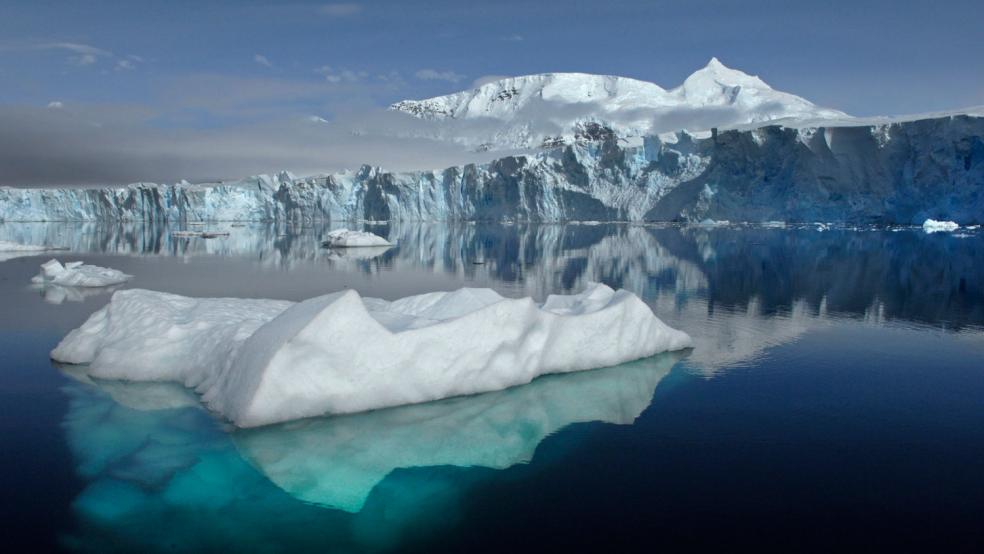Here’s a clue to the reception Energy Secretary Ernest Moniz and EPA Administrator Gina McCarthy may get Wednesday when they defend President Obama’s major climate change initiative before the GOP-controlled House Energy and Commerce Committee: 22 of the 30 Republican members, or 73 percent, deny the reality of climate change, or don’t think it’s a man-made problem.
More broadly, 90 percent of the GOP leadership in the House and Senate say they don’t believe carbon pollution has contributed to disruptions in weather patterns, Arctic melting and severe storms and flooding. Finally, 100 percent of Senate Environment and Public Works Committee Republicans are climate change skeptics or deniers, according to a recent analysis by the left-leaning Center for American Progress Action Fund. Sen. James Inhofe (R-OK), the foremost Republican spokesman on the topic, even wrote a book, The Greatest Hoax: How the Global Warming Conspiracy Threatens Your Future.
So expect a frosty greeting on Capitol Hill for the public airing of Obama’s plan to limit global warming by bypassing Congress and having executive branch agencies unveil rules to reduce emissions from power plants.
While dozens of Republicans are prepared to shut down the government to stop the Affordable Care Act, they are relatively powerless to stop Obama on climate change. It’s an opening for the administration made possible by a 2007 Supreme Court ruling that said the Clean Air Act includes the authority to address climate change.
REGULATIONS MOVE FORWARD
Obama has directed the EPA to set carbon pollution standards for new and existing coal-burning plants, with final regulations being put in place by June 2015. Electric power plants by far are the largest source of global warming in the country, responsible for nearly 40 percent of greenhouse gas emissions that scientists have directly linked to climate change. Currently, 1,142 coal-fired utility plants operate across the country.
Obama outlined a series of initiatives – both old and new – for addressing threats of climate change, including a requirement that all new federal projects be able to withstand rising seas and more intense storms, such as the barrage the eastern seaboard faced last year from Superstorm Sandy.
The strategy also calls for increased fuel standards for large vehicles and sets an ambitious goal of reducing 3 million metric tons of carbon pollution by 2030 – half of the U.S. annual output – by improving energy efficiency standards for federal buildings and appliances.
THE GOP PUSHBACK
Republican critics charge that many of the president’s earlier initiatives have hurt the economy by eliminating jobs or wrapping utilities and industrial manufacturers in red tape. These complaints are likely to be recurring GOP themes during today’s hearing before the Subcommittee on Energy and Power.
“Undoubtedly House Republicans will continue to make every effort to block President Obama from enforcing the Clean Air Act as defined by the [Chief Justice John] Roberts Court,” said Daniel J. Weiss, a senior fellow and the director of climate strategy at the Center for American Progress. “Their future efforts to block President Obama’s Climate Action Plan are doomed to failure, as have all of their previous efforts.”
Rep. Ed Whitfield (R-KY), the subcommittee chair, already has set the tone for the hearing by loudly complaining the administration isn’t taking his panel seriously enough. He noted that officials from only two of the 13 federal agencies he invited to testify will be taking part – though Moniz and McCarthy are two of the biggest players for the administration on the issue.
“What does it say about an administration that is largely unwilling to testify on its top policy initiative?” Whitfield said. “More than $77 billion was spent between 2008 and 2013 across the government on climate activities, and yet the ‘most transparent administration in history’ can only find two people to testify from these agencies that employ tens of thousands of employees and receive significant funding.”
80 NEW EPA RULES
Since January 2009, the Obama Administration has advanced a wide range of climate change-related regulations. This includes 80 new EPA rules, according to a subcommittee staff summary.
At the Department of Energy, the administration has developed new energy conservation standards for numerous household and commercial goods and products, ranging from microwave ovens, to furnaces, air conditioners, freezers, refrigerators, kitchen ranges, dishwashers, clothes washers, beverage vending machines, water heaters, and pool heaters and other consumer, commercial and industrial equipment.
The administration has also developed “Social Cost of Carbon” (SCC) estimates for use by federal agencies “to estimate the climate benefits of rulemakings.”
While the U.N.’s Intergovernmental Panel on Climate Change (IPCC), the National Academy of Sciences, the American Meteorological Society and a handful of other scientific bodies have all concluded that climate change is real and dangerous, 131 House Republicans and 30 GOP senators deny the basic tenets of climate science, according to the CAP study.
Moreover, utilities and the fossil fuel industry are an active force on Capitol Hill, willing to contribute tens of millions of dollars annually to sympathetic lawmakers.
One beneficiary is Whitfield, who represents the interests of the Kentucky coal mining industry. The veteran GOP lawmaker strongly opposes Obama’s climate change action plan, which he says would impose costly regulations on coal-fired plants and expand taxpayer spending for more climate activities across the government.
So the hearing room will be filled with sound and fury – but Whitfield and Republicans know that they might as well be talking to a brick wall.
“The president's plan to regulate power plants is not surprising,” Whitfield said. “Over the past four-and-a-half years, his administration has vigorously pursued this goal through cap-and-trade legislation and a swarm of costly new EPA regulations. The president’s action plan seeks to limit our nation’s fuel choices and make coal-fired electricity generation in this country extinct, despite the fact that coal is our largest source of electricity and one of the nation’s most abundant and affordable resources.”






